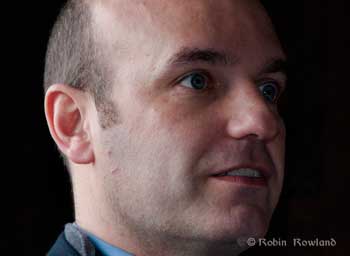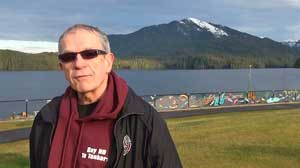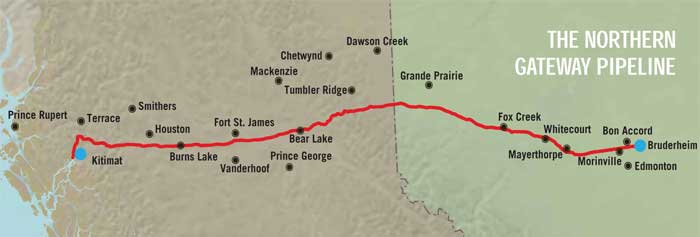The Terrace, BC, town council voted 5-2 Monday night to oppose both the Enbridge Northern Gateway pipeline project and the associated tanker traffic along the British Columbia coast.
Sentiment among councillors and mayor showed all were opposed or wary in one way or another about the pipeline project that would carry bitumen from Alberta to Kitimat and send it via tanker from Kitimat. The vote split on whether the council should take a position now, or wait until there is a final report from the Joint Review Panel which is now holding hearings.
Councillor James Cordeiro introduced a motion that the council first rescind a motion from last March that it remain neutral on the issue and second adopt the position taken at the Union of British Columbia Municipalities that council should 1) oppose the shipping of tar sands oil in pipelines across northern BC for loading crude oil onto tankers and 2) oppose any expansion of bulk crude oil tanker traffic in Dixon Entrance, Hecate Strait, and Queen Charlotte Sound.
Cordeiro told council that during the election campaign last fall he found there was “overwhelming” opposition to both the bitumen pipeline and to the tanker traffic. He found there were a small number of people either in favour or waiting for more information, to which he responded, that if there is enough information for supporters to formulate their opinion, there is also enough information for those opposed.
The promise of jobs and new oil export opportunities “are weak at least and do not meet the threshold of the wishes of the electorate,” Cordeiro told council. He went over the current economic situation where Alberta oil is sold to the United States at a discount but can be sold to Asia at world market prices. “Alberta will reap billions of dollars in the short term. BC will not get a fair share of Alberta’s windfall. This is not acceptable to the citizens of Terrace.” He said the best approach was to support Terrace’s First Nations neighbours in their opposition to the pipeline and look for projects that would bring long term benefits to British Columbia.
Councillor Marilyn Davies said she too found little support for the pipeline during the recent election campaign. “I really can’t see what’s in it for us,” she said. “I am a free enterpriser, but this does not deserve free enterprise support. We get some benefits but at what cost? The environmental risk is way too high.” She also said there is not enough information about who is funding the pipeline project and not much information about who is funding the tar sands. Davies said the bitumen should be upgraded in this country, not in a country known for its human rights abuses. “Why should we gamble? We get very little, and that’s in the short term, whereas we could lose something that can never be replaced.”
Brian Downie, who voted against the motion, took the view that voting at this time did not serve Terrace’s best interests. He pointed to “a dozen years of recession” in Terrace that is “just starting to turn around in a fragile recovery.” Downie said he was worried about how the vote would affect Terrace’s economic reputation, pointing to the recent vote by Kitimat council to put off any decision until after the Joint Review reports.
Downie said wasn’t logical to rush the process and to take a position in advance of the JRP report. He then concluded by saying: “I have heard the arguments for and against. I have participated in the Community Advisory Board and I am not convinced there are substantial direct benefits for Terrace and I have concerns with the geotechnical issues.” Downie also said he had reservations about how well Enbridge can manage the project, but, in the end, he said, it is best to defer to the Joint Review Panel for now.
Councillor Stacey Tyers was clear in her position, that the JRP process can’t be trusted. It went from environmental to economic, she said. As for the pipeline: “It is good for Alberta and good for Ottawa, while we get few benefits. It is important to take a stand, to stop sitting on the fence. It is imperative to take a decision, to get off the fence. We must join the coastal First Nations in taking a stand, opposing what isn’t good for our community.”
She concluded by adding, “If it’s good for Kitimat, let them vote on it.”
Mayor David Pernarowksi said that he understands the majority of people in Terrace are opposed to the pipeline. He then added that some people in the economic development community believe that remaining neutral made more sense, because taking a position now could put Terrace in a “precarious position.”
While Pernaroswki said he is personally opposed to the pipeline project, but he felt it was the duty of council to listen to the 4,000 people who have signed up for the Joint Review, to listen through the presentations by both the intervenors and those making oral comments: “I would like to hear from these people, I don’t want to deny my thoughts. We don’t think this project makes sense but Council has a responsibility to listen to the panel. We shouldn’t make a decision until we hear from those people.
“It’s tough one. We see the risk, I am currently opposed to the project, because a majority of the First Nations oppose it. I am going to have a hard time to stand in difference to our First Nations community. November would be more appropriate to bring this before council.”
He concluded by saying the economic position may be different by November, there could be community benefits as a result of on-going meetings between the provinces of British Columbia and Alberta that could bring financial contributions that Terrace badly needs. “I am not saying it’s all about the money. I’d like to show that we’re open to listening and then coming to a good solid, reasoned, knowledgeable conclusion to what this community really wants.”
The veteran politician then said, “I have done the numbers.” knowing the vote would be to oppose the pipeline. He voted against the motion.
Cordeiro told council. “We don’t have to wait until Alberta sweetens the deal.”
The final speaker was Councillor Bruce Bidgood, who said that he had voted in March to remain neutral, but that Prime Minister’s Stephen Harper’s attacks on opponents of the pipeline as “enemies of Canada” had led him to change his vote to oppose the pipeline.
“I believe Terrace is open for business,” he said. “It’s just not for sale at any price.”







